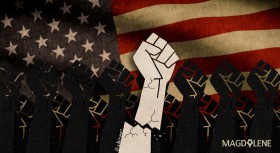Religious conservative values have grown more mainstream in Indonesia over the past decade and fringe Islamist groupings have shifted from the periphery to the center of the political stage, but their populist appeal will not likely translate to a long-term success, according to a prominent scholar.
Vedi R. Hadiz, a professor of Asian Studies at University of Melbourne’s Asia Institute, expressed his doubts during a recent discussion at Tempo media group office that Islamic populism will reign supreme, citing a failure in building cross-class alliance.
Two major rallies on Nov. 4 and Dec. 2 last year might have seemed like a good momentum for Islamic groups to unite and build a coalition, but the movement was mere reactionary, a temporary response to the alleged blasphemy by incumbent Jakarta Governor Basuki ‘Ahok’ Tjahaja Purnama, who is a strong contender for the election this month, Vedi said.
“The coalition is asymmetrical – it would be difficult to maintain,” said the prolific scholar, who last year published the book Islamic Populism in Indonesia and the Middle East, the results of his research in Turkey, Morocco, Tunisia and Egypt.
Using approaches from historical sociology and political economy, Vedi argues in the book that “competing strands of Islamic politics can be understood as the products of conflicts within a variety of social and historical context.”
“The explanation about Islamic politics in Indonesia has always been dictated by aspects of theological doctrines. After the [2002] Bali bombing, the issue became terrorism. Currently, it is as if Islamic movement is transnational. Maybe that is true for ISIS and al-Qaida, but most of the time the battle is within domestic realm,” he said.
Nothing is predetermined, he added, the political Islam of today is the results of recurring social conflicts throughout history.
Islamic politics in Indonesia is comparable with that in Turkey and Egypt, he said, given their majority Muslim populations and the countries’ strategic economic and geographical significance. The social processes that formed Islamic politics in these countries were similar, but the results have been different. Islam had been a response to the West’s colonialism and domination, but in the beginning of the state’s modernization process, Islam was eliminated and lost. During the Cold War in the 1960s, Islamic groups were recruited in the three countries to wipe out the leftist groups. Afterward, however, Islamic groups were repressed.
In Turkey, the ruling Justice and Development Party (AKP), the conservative political party affiliated with President Recep Tayyip Erdogan, has succeeded in building a robust cross-class alliance. AKP comprises educated middle class coming from well-off families in the region. These educated people managed to build non-Istanbul bourgeoisie that have come to prominence since the neoliberalization in the 1980s, particularly in export business. They had an ambition to beat conglomerations and the AKP is the tool to seize the economy.
This group then has the resource to build an alliance at the grass-roots level. Poor people who are socially liberal are glued together.
“AKP finally controlled the country and its institutions. And they did it without mentioning about Islam or protecting the ummah (people),” said Vedi.
Egypt has a similar history with the Ikhwanul Muslimin (Muslim Brotherhood), which copied the Turkey model. The Brotherhood started like Syarikat Islam in Indonesia, grouping business people and turning them into a political group. Its social basis then grew and it created a deal with former president Hosni Mubarak.
“The government allowed Muslim Brotherhood to grow because the state has no money. The bourgeoisie then emerged, like in Turkey. Muslim Brotherhood came into prominence. They are pro-market and pro-democracy, and they never talked about Islam because they see Turkey as their model,” Vedi said.
“The problem is, Muslim Brotherhood wanted to achieve what AKP has successfully built in decades in a short period of time. And they failed.”
Islamic Populism
Populism, Vedi said, is a conflict between the people, who have virtuous values but are repressed, and exploitative small elites that are culturally foreign. The mass is diverse, and it is the main job of populists to hegemonize the heterogeneous people. The function of populism is to, at least, temporarily delay social reality.
Politics is the competition to control resources and ruling institutions. AKP in Turkey has succeeded in doing it, as well as Muslim Brotherhood before they were toppled. But in Indonesia, Islamic groups fail to control the state and civil society. The implication is that it gives opportunities to people who don’t have resources; and it provides ways for these groups to show that democracy is flawed.
“There is now a competition to say that I’m more Muslim than you. The result is the mainstreaming of [conservative] values, even within [traditionally secular] institutions like Golkar and PDI Perjuangan,” said Vedi, referring to the two largest political parties in Indonesia.
All these are actually part of the ongoing competition for resources and economy, he argued.
“I’m not saying that [the Islamic groups] don’t believe in what they say, but their beliefs are adapted to the situation. Take the Salafi, if they stick to what they believe in, could they even run in the General Election?” he said, referring to the ultra-conservative fundamentalist movement.
Furthermore, unlike the alliance in Turkey and Egypt, the Islamic alliance in Indonesia is asymmetrical, fragmented and difficult to maintain.
“Why have they failed to build cross-class alliance? Because in Indonesia, there is no [Islamic] bourgeoisie, which is the result of the social division in the Dutch colonial time,” said Vedi.
“In Indonesia, the most important effort to build cross-class alliance occurred during the 411 and 212 rallies last year, but they currently have nothing that unifies them. It is most likely a temporary response.”
Even if it could be permanent, the constraints are too big, he said. Islamic groups like Hizbut Tahrir Indonesia (HTI) do not have strong grass-roots presence, while the Islam Defenders Front (FPI) is a vigilante group that does not have a big civil society base, the reason why they have to form alliance with state elements.
“The state is not monolithic. It doesn’t have a consistent stance in politics. That’s why the fringe groups thrive,” Vedi said.
Nevertheless, Vedi does not believe that violence-prone FPI should be disbanded, saying that the spillover effect of their dismissal would be extensive.
“It shouldn’t be disbanded because that is an authoritarian act. But if they violate the laws, they should be brought to court and punished.”
Read Hera’s piece on the plight of Indonesian migrant workers and follow @heradiani on Twitter.





1.jpeg)



Comments